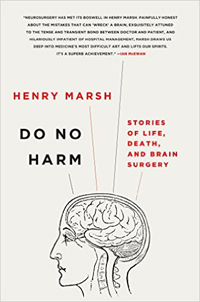 Henry Marsh, Do No Harm; Stories of Life, Death, and Brain Surgery (New York: St. Martin's Press, 2014), 277pp.
Henry Marsh, Do No Harm; Stories of Life, Death, and Brain Surgery (New York: St. Martin's Press, 2014), 277pp.
"As I approach the end of my career," writes the British neurosurgeon Henry Marsh, "I feel an increasing obligation to bear witness to past mistakes I have made." When Marsh communicated that sentiment to a meeting with American colleagues, it was met with "stunned silence." A surgeon who publicly admits his mistakes?
Marsh's memoir isn't really a confession as much as it is an honest account by an insider of what neurosurgery is really like. There's the exhilaration of the craft — "The idea that my instrument is moving through thought itself, through emotion and reason, that memories, dreams, and reflections should consist of jelly, is simply too strange to understand." The satisfaction of helping people and solving problems.
There's also the difficulty of balancing honesty and compassion when speaking to patients and their families. The "Olympian detachment" required to perform well. Frustrations with medicine that's controlled by government bureaucrats. Then a whole range of emotions and experiences — the "tragic consequences of my hubris," the gross incompetence of a junior surgeon, "intense anxiety," self-importance and a superiority complex, bitter regrets, false optimism, and mistakes that "ruined lives." Marsh also describes his experiences on the other side of the table, as a patient himself (a detached retina and a broken leg), and when his three-month-old son had brain surgery.
Looking back on his days as a "hardened, all-important, invulnerable young doctor," Marsh writes, "I am less frightened by failure — I have come to accept it and feel less threatened by it and hopefully have learned from the mistakes I made in the past. I can dare to be a little less detached. Besides, with advancing age I can no longer deny that I am made of the same flesh and blood as my patients and that I am equally vulnerable."
I read this book because of its positive review in the New Yorker, and I'm very glad I did. It's sure to draw comparisons with a similar volume by Atul Gawande, Complications: A Surgeon's Notes on an Imperfect Science (2003).


